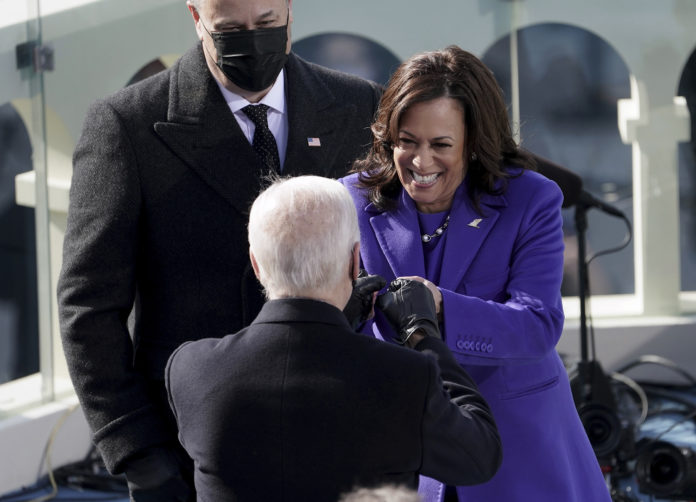
By Meredith Pratt | Assistant News Editor
Kamala Harris made history Wednesday afternoon when she became the first woman of color to become vice president. Justice Sonia Sotomayor, the first Latina justice on the U.S. Supreme Court, had the honor of swearing in Harris.
Women throughout the Baylor community have reacted to this milestone, with many feeling encouraged by the further breaking of glass ceilings for women in politics.
North Little Rock, Ark., senior Mya Ellington-Williams said this occasion felt “monumental” for her.
“Representation is so important,” Ellington-Williams said. “I mean, you can always imagine yourself going to certain places, but when you see yourself in the space already … just knowing that you won’t necessarily have to break the barrier to be able to do that.”
As president of the Black Student Union and a representative for the Black Student Coalition, Ellington-Williams said she sees this moment in history as one that will help empower women of color to pursue their dreams.
“It’s going to be very encouraging for young girls and young ladies to pursue politics, to pursue medicine, to really know that they can do anything they want to, now that we see a woman hold this office for the first time,” Ellington-Williams said.
Ellington-Williams is also Vice President of the Baylor chapter of Alpha Kappa Alpha Sorority Inc. (AKA). She said being in the same sorority as Harris feels “extraordinary.”
AKA is the nation’s first African American Greek-lettered sorority. It was founded in 1908 at Howard University, Harris’ alma mater.
“Alpha Kappa Alpha was founded by women not too far removed from slavery, so we have founders whose parents or grandparents were slaves or were enslaved people,” Ellington-Williams said. “Now we have a member who is going to hold one of the highest offices in the land. I think that’s what makes it so surreal. A real full circle moment.”
An Oakland native, Harris’ parents both immigrated to the United States — her mother from India and her father from Jamaica.
Beaumont senior Christine Phan said Harris’ role in the new administration sets up “a lot of precedents for children of immigrants.”
“Within the Southeast Asian immigrant community, there’s a lot of emphasis on who you know as it’s a determinant for your future career,” Phan said. “So, for example, I want to be a politician, personally, and my parents don’t believe that I will be successful in that field because there’s not a lot of representation for Asian women in that field. But there’s a lot of representation for doctors who are Asian, and so they tend to push me towards a certain field where it’s heavily populated by Asians because it seems to be more successful.”
Phan is the external vice president of the Vietnamese Student Association at Baylor and a junior senator for Student Senate. She said Harris’ South Asian heritage is something she does not take for granted.
“That is a part of her identity that I can use to convince my parents like, ‘Hey, she made it.’ Despite a lot of the odds that were against her, she was able to pursue her aspirations and make it really successfully in the United States,” Phan said.
However, Phan said she worries about tokenization, a political topic most recently discussed during the Obama administration.
“Many claim that because we had the first Black president that we now live in a post-racial society. Yet, we can see through current events and through narratives that that is not the case — we still live in a very racialized society,” Phan said. “I feel like with Kamala Harris being a woman and also a woman of color, people are going to claim, ‘Oh, sexism doesn’t exist anymore.’”
While Phan said she acknowledges that Harris “broke the barrier,” she still thinks that Harris “represents one of the very few who’s able to make it” and that more work can be done to bring about true equality.
“Fighting the good fight is more than just diversity and representation initiatives. It’s more than that,” Phan said. “I think we have to zero in on what causes these obstacles in the first place that prevent women and women of color from obtaining these positions more than other populations and communities in the United States.”





